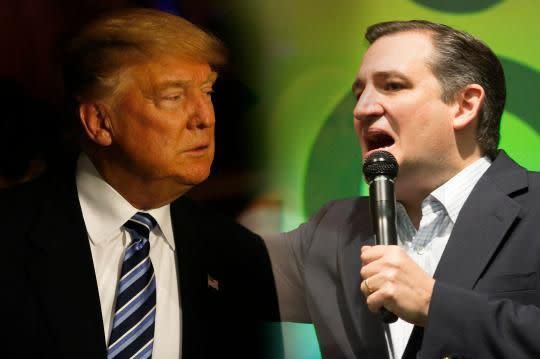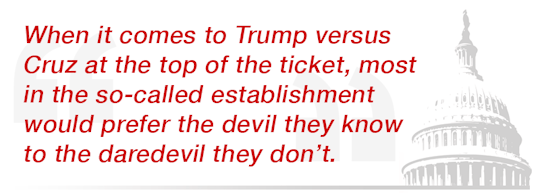What D.C. Republicans will do if it’s Trump vs. Cruz

Photo illustration: Yahoo News; photos: Brynn Anderson/AP, J Pat Carter/Getty Images
Imagine you have this incredibly valuable sports car, and when you drive it up to a valet stand there are two guys anxiously vying to take the keys. One of them looks wild-eyed and agitated, like he just drank seven Red Bulls. The other is a guy you remember from high school, except that you hated each other and he’s eyeing the hubcaps with contempt.
Now you have a rough idea of how Republican insiders in Washington are feeling this week. With the season of choosing passing its midpoint, governing Republicans are slowly resigning themselves to what looks like a two-man race between the unpredictable Donald Trump and Ted Cruz, a man so universally disliked that if you Google “hated senator,” every single link that pops up is about him. (Try it yourself.)
It’s an agonizing thing for them to contemplate, but in conversations with a half dozen of the leading Republican strategists and lobbyists this week, it became clear that a solid consensus is forming as to which guy they would rather see get the keys. When it comes to Trump versus Cruz at the top of the ticket, most in the so-called establishment would prefer the devil they know to the daredevil they don’t.
For the moment, of course, Trump looks very hard to stop. And if you’ve been paying attention to his debates and election night speeches lately, you may have noticed that — in between recitations of every poll he’s ever read, and the rambling monologues on genitalia and civil jurisprudence, and the brandishing of his personal steaks and his own print magazine (who knew?) — he’s been consciously trying to reach some kind of rapprochement with party insiders.
On Tuesday night, for instance, after winning in Michigan and Mississippi, Trump used the opening minutes of his victory speech/news conference/traveling revue to call for party unity. He managed to cough up some kind words for Paul Ryan and Lindsey Graham and even Mitt Romney, whom he said he didn’t really know, despite having recently called him a “dope” and a “loser” and “one of the dumbest and worst candidates in the history of Republican politics.”

(And those insults came before Romney essentially pleaded with all right-minded Republicans to banish any thought of Trump as a nominee and bury the brief flirtation in some dark hole of repressed memory.)
All of which may yet lead to some awkward photo ops and panic-induced endorsements on the Capitol steps should Trump be nominated, but make no mistake: Most Washington Republicans want about as much to do with Trump as he does with them.
They see him as erratic and untrustworthy, an ideological trespasser who would borrow the party but holds dear few of its conservative convictions. And they’re profoundly troubled by an authoritarian streak — on issues like immigration and the military’s treatment of civilians — that would seem to make George W. Bush look like a lawyer for the ACLU.
Vin Weber, the congressman turned superlobbyist, does a pretty tidy job of encapsulating these concerns. “I don’t think he’s a ‘big R’ Republican, and I don’t think he’s a ‘small D’ democrat,” Weber told me, “and both of those are big problems for me.”
Most of the party’s governing class, of course, is still hoping for a kind of triple bank-shot gambit to stop Trump’s march toward the nomination. The latest plan goes like this:
Somehow hope that Marco Rubio — who received exactly zero delegates from the four contests earlier this week — can stage a comeback win in Florida Tuesday, while John Kasich manages to eke out a win in Ohio (where he’s the governor, by the way). Then keep Trump from amassing the 1,237 delegates needed to lock up the nomination before the convention, by which time Republican leaders will have settled on a preferred candidate (probably Kasich) whom they can try to ram through.
Which isn’t a terrible plan, except that it’s a little like me saying I have a brilliant plan to become a billionaire, and all I have to do is start by coming up with some kind of amazing app that everyone in America wants to buy. Hope is not a strategy.
The more likely scenario for denying Trump the nomination, at this point, is that Cruz can overtake him, or that he ends up mounting a serious convention challenge if Trump can’t lock up the delegates before then. And while the D.C. elites are none too jazzed about this possibility, they’re starting to almost embrace it.
The reason Republicans in Washington don’t like Cruz is that even by the standards of Washington, where we think of blatant self-promotion the way most other Americans think about getting out of bed in the morning, he seems to stand out for his insincerity. Colleagues disdain the holier-than-the-rest-of-you image he has cultivated since arriving in the Senate just three years ago.

But that same opportunism, they will tell you, is what ultimately makes Cruz a more palatable nominee. That’s because they assume that Cruz’s evangelical and anti-government purity is more a matter of political positioning than it is of actual zealotry.
If nothing else, the insiders believe, Cruz is coachable and calculating in a way Trump is not, and he’s a more reliable conservative.
With Cruz as the nominee, Republicans figure they have at least an outside shot at holding the Senate, mainly by giving their more vulnerable candidates some distance from him. Less so with Trump, whose insatiable need for controversy and incendiary appeals to emotion might overwhelm everything else.
None of which is to say that Cruz has a better chance of winning than Trump. He doesn’t, and even most governing Republicans will admit that Trump could conceivably broaden the appeal of the party nationally, while Cruz almost certainly runs it aground. He’d have a better chance of landing his own show on MSNBC than he would of winning the popular vote — something Republicans have done only once in the last 20 years.
But that might not be the worst thing in the world, either. If Cruz were to become the nominee and suffer a Goldwater-type thrashing in November (which probably can’t happen, given the polarized electoral math of the country today, but he could certainly do worse than John McCain or Mitt Romney), then governing Republicans might finally be able to go on the offensive against their own activists.
The argument then would go something like this: “Hey, we tried it your way, and we nominated a purist, and we got dismantled, and now the Clintons are prying up floorboards in the Lincoln Bedroom and retrieving all the secret files they once squirreled away. So maybe it’s time to build a more tolerant party that actually governs.”
It’s a bleak excuse for optimism, to be sure — half-hoping to lose in the expectation that you can make people understand how to win. But for Republicans in Washington, it’s all pretty bleak right about now.
If you think your choice is between a reckless driver and a spiteful one, maybe the only realistic goal is to keep the car in one piece.

